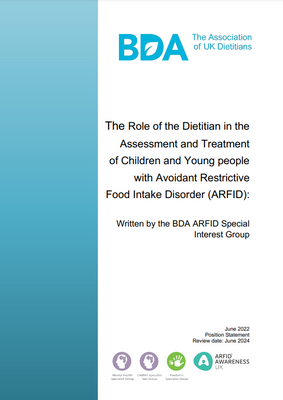This position paper has been written by members of the ARFID Special Interest Group (ARFID SIG). The ARFID SIG is part of the British Dietetic Association (BDA) CAMHS sub-group of the BDA Mental Health Specialist Group.
Find out more about the process and reason the position paper was written in this blog.
What is ARFID?
Avoidant/Restrictive Food Intake Disorder (ARFID) was introduced as a new mental health and behaviour disorder diagnosis in 2013. ARFID is characterised by a pattern of eating that avoids certain foods or food groups entirely and/or eating small amounts due to lack of interest in food, high sensitivity to sensory aspects of food (such as texture, colour, or taste), and/or fear of aversive consequences such as being sick or choking.

These restrictive eating patterns can result in significant health problems. It differs from other eating disorders in that people with ARFID do not restrict their food intake for the specific purpose of losing weight or managing feelings of fear and anxiety around their shape and size.
Dietitians with specialist training are essential for the management of ARFID from the point of assessment and diagnosis and throughout treatment. When dietitians are not embedded within a team and dietetic time is not adequately resourced, there is likely to be nutritional and dietary compromise of patients.
This will impact on their physical health and wellbeing, psychosocial functioning, quality of life, growth and may lengthen treatment of the patient with ARFID. In turn this is likely to have cost implications, impact the rest of the team and affect patient care if the patient deteriorates further in health. Services are currently being developed for CYP with ARFID throughout the UK. Funding to support adequate dietetic time in ARFID services is essential and this paper aims to identify what the BDA considers is adequate and why.
Misdiagnosing and underdiagnosing ARFID has serious implications for patient care, and it requires specialist and multidisciplinary assessment and care pathways. This position paper highlights the importance of early identification of nutritional deficit and management and the important role of dietitians.
About the position paper
This position paper has been written by members of the ARFID Special Interest Group (ARFID SIG). The ARFID SIG is part of the British Dietetic Association (BDA) CAMHS sub-group of the BDA Mental Health Specialist Group.
The authors collaborated with members of the Paediatric Specialist Group. ARFID Awareness UK (AAUK) were also consulted (AAUK) to include the voice of patients and carers.
The need for a position paper came about from the recognition of ARFID as an eating disorder in both the DSM-5 criteria and ICD11 in 2013 and 2022 respectively. This position paper has focused on Children and Young People (CYP).
A group of dedicated and highly specialist dietitians in eating disorders and paediatrics UK wide convened. The draft was circulated to specialist ARFID colleagues including paediatricians, psychologists, and dietitians.
Our acknowledgements go to Glenn Waller, Rosan Meyer, Luise Marino, Rachel Bryant-Waugh, Damien Wood, Gillian Harris, Susan Meredith and ARFID Awareness UK.

